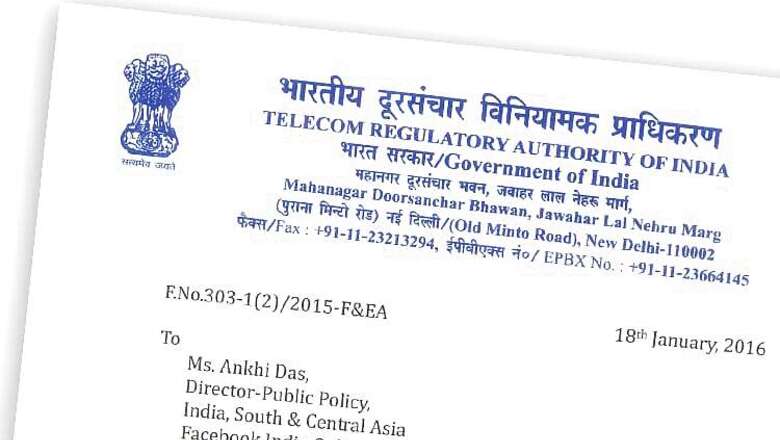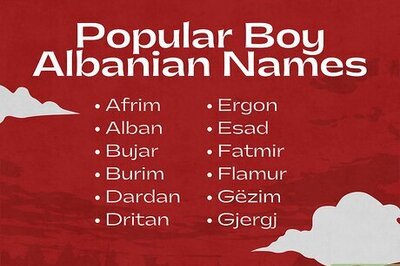
views
The Telecom Regulatory Authority of India (TRAI) has made public a strongly worded letter (see below) addressed to Facebook countering allegations levied by the social media giant and criticising the manner in which the company made millions of its users send emails to TRAI in support of the controversial Free Basics service.
The letter addressed to Ankhi Das, Facebook's director-public policy for India, South & Central Asia, TRAI reiterates its previous stance that the responses sent in by Facebook on behalf its users were not, in fact, responses to the four questions posed by the regulatory authority in its consultation paper on 'Differential Prices for Data Services' but merely templatised response expressing support of Free Basics.
On Facebook's act of levering its huge user base to drum up support for Free Basics, TRAI says that Facebook's "urging has the flavour of reducing this meaningful consultative exercise designed to produce informed decisions in a transparent manner into a crudely majoritarian and orchestrated opinion poll."
TRAI, in the letter, expresses apprehensions that Facebook acts, if accepted, "has dangerous ramifications for policy-making in India."
TRAI also conveys its concern about Facebook's "self-appointed spokesmanship" on behalf of its users and says that "it is noticed that you have not been authorised by your users to speak on behalf of them collectively. No disclosure in the act of sending a message to TRAI using your platform to this effect has been issued to users."
Facebook had alleged that someone at TRAI's office blocked email from its websites which people used for sharing their comments on the differential pricing issue. "It is surprising that it took over 25 days for you to inform TRAI of this," says TRAI in its response.
Facebook, has, on its part, issued a statement in response to TRAI's letter, in which it hints at been singled out and says that the company was "not aware of a similar request having been made to any of the other commenters who did not answer these specific questions."
"While we did not include all of the specific language drafted by TRAI," acknowledges Facebook, but says that it "did deliver a request for additional information and included in the draft email the exact language from the four specific questions posed in the consultation paper. More than 1.4 million people responded by submitting revised comments that addressed these questions."
TRAI is conducting an open house discussion on differential pricing for data services, a key aspect of Net neutrality, on January 21. In a notification, TRAI said "interested stakeholders are invited to participate" in open house discussion on its consultation paper on 'Differential Prices for Data Services'. The event will be held at PHD House in New Delhi.
Telecom operators have favoured differential pricing for data services while Net neutrality activists continue to oppose any differential pricing regime, saying it would amount to curbs on freedom of choice to access Internet.
Facebook's Free Basics service offers people without the Internet free access to a handful of websites through mobile phones.
The debate on Net neutrality stirred across India after Airtel decided to charge separately for Internet-based calls but withdrew it later after people protested. Internet activists and experts flayed the operator for 'Airtel Zero' service along with Facebook's Internet.org service, later renamed as 'Free Basics.'
Net neutrality implies that equal treatment be accorded to all Internet traffic and no priority be given to an entity or company based on payment to content or service providers such as telecom companies, which is seen as discriminatory.
Countries like the US, Chile, Netherlands and Brazil have already adopted Net Neutrality that doesn't allow discrimination of Internet content or charge users differently based on the content, site, or platform they consume, the debate is still raging in India.
Facebook had unleashed a media onslaught to garner support for its controversial Free Basics program that included multi-page ads in national dailies, outdoor hoardings, television spots and perhaps the most effective of them all - Facebook notifications.
Earlier, in July 2015 the Department of Telecom panel on Net neutrality has opposed projects like Facebook's Internet.org, which allow access to certain websites without mobile data charges, while suggesting that similar plans such as Airtel Zero be allowed with prior clearance from TRAI.
Full text of TRAI's letter to Facebook:
18th January, 2016
To
Ms. Ankhi Das,
Director-Public Policy
India, South & Central Asia
Facebook India Online Services Pvt. Ltd
Suite No.422 & 424, Taj Mahal Hotel
No.1 Mansingh Road
New Delhi - 110 001
Dear Ms. Das,
This is with reference to your letter dated 13.01.2016 in response to TRAI letter of even number dated 07.01.2016. The undersigned is directed to convey the following:
(1) TRAI in its letter dated 01.01.2016 had requested you to elucidate whether Facebook has communicated TRAI'S message and the manner/text in which the same was conveyed to the Facebook users, who had ostensibly responded to TRAI's Consultation Paper on Differential Pricing for Data Services issued on 09.12.2015 (hereinafter "Consultation Paper") through the domain name "@facebookmail.com" and "@supportfreebasics.in".
(2) Your response on 13.01.2016 again states as follows:
"Specifically, in accord with your request, we reached out to the people who had commented through Facebook and asked them to answer specifically the four questions TRAI raised in the consultation paper."
(3) However, your response is silent on whether the text of TRAI's communication was shared with such users as was specifically requested by TRAI. In light of the tangential nature of the responses by the users to the questions asked, the communication of such text was vital to demonstrating and ensuring that those who are responding to TRAI are making informed decisions. The only reasonable inference that can be drawn from your communications in this regard despite two efforts by TRAI to request you for a clarification, is that the text of TRAI's communication was not in turn conveyed by you to those who had sent responses to TRAI using your platform.
(4) Further, you have mentioned in your response dated 13.01.2016 that no e-mail could be delivered to designated e-mail id for receiving responses ([email protected]) from Facebook due to such access appearing to be blocked from 17 December 2015. If this were indeed the case, TRAI should have been informed immediately for appropriate steps to be taken. In fact, a similar instance of user complaint regarding the non-functioning of an email address during the response period for this Consultation Paper was brought to the notice of TRAI by individual stakeholders and the situation was immediately rectified. It is surprising that it took over 25 days for you to inform TRAI of this.
(5) Notwithstanding anything in the foregoing paragraphs, given TRAI's commitment to ensuring that all stakeholders have an opportunity to make their considered points of view on issues raised in the Consultation Paper to TRAI. As communicated by Chairman, TRAI in his meeting with Facebook representatives on 14th January 2016 at 3p.m., TRAI will take into account all relevant responses that seek to answer the questions raised in the Consultation Paper that you have also made available to TRAI in a pen-drive on the same day.
(6) At the same time, it is crucial to underline that your continued assertion that the initial template responses sent by users through Facebook in support of 'digital equality' and 'Free Basics, are appropriate responses to the consultation paper, is wholly misplaced.
The questions put by TRAI were:
"Question 1: Should the TSPs be allowed to have differential pricing for data usage for accessing different websites, applications or platforms?
Question 2: If differential pricing for data usage is permitted, what measures should be adopted to ensure that the principles of nondiscrimination, transparency, affordable internet access, competition and market entry and innovation are addressed?
Question 3. Are there alternative methods/technologies/business models, other than differentiated tariff plans, available to achieve the objective of providing free internet access to the consumers? If yes, please suggest/describe these methods/technologies/business models. Also, describe the potential benefits and disadvantages associated with such methods/technologies/business models?
Question-4: Is there any other issue that should be considered in the present consultation on differential pricing for data services?"
(ii) The template response was as follows:
"To the Telecom Regulatory Authority of India, I support digital equality for India. Free Basics provides free access to essential internet services like communication, education, health-care, employment, farming and more. It helps those who can't afford to pay for data, or who need a little help getting started online. And it's open to all people, developers and mobile operators. With one billion Indian people not yet connected, shutting down Free Basics would hurt our country's most vulnerable people. I support Free Basics - and digital equality for India. Thank you."
(iii) In your letter dated 13.01.2016 you have also written:
"In light of the above, we urge TRAI to acknowledge and consider all of the 16 million comments sent by people in support of Free Basics in a manner befitting the spirit and letter of a consultative process. The vast majority of these responses clearly support rules that will allow Free Basics to continue to operate under any regulatory regime. All of them were sent to the correct email address in a timely fashion, but none were delivered as a result of the action taken to unsubscribe from delivery of Facebook emails. It would be an unfair and unjustifiable result for the voices of these millions of Indian not to be heard before deciding on a final policy on differential pricing."
(7) As is evident, the above template response does not address the questions raised in the Consultation Paper except one response received on 7th January 2016. You may please note that this particular response addressing the questions raised in the Consultation Paper has already been uploaded on TRAI website along with comments of other stakeholders. However, previous responses do not indicate that these were in reference to TRAI consultation paper. Furthermore, there is no mention of the consultation paper/process at all in the entire response. As you well know, the consultation paper is on Differential Pricing for data services and not on any particular product/service. This was precisely the reason why we wanted to reach out again to such users so as to enable them to send appropriate responses after reading the consultation paper and had extended the date of submission of responses.
(8) In addition, we are constrained to express deep misgivings about such a statement as noted in Para 7 above. First, the rationale for a consultative exercise as described in the ICT Regulation Toolkit (http://www.ictregulationtoolkit.org/en/toolkit/notes/PracticeNote/756)
6) is as follows:
"Public consultations promote two important regulatory objectives. First, they provide the regulator with valuable input from industry members and other stakeholders. Public consultations therefore help regulators to make informed decisions. Second, public consultations help to foster a transparent regulatory environment."
(9) TRAI fully subscribes to this view when engaging in public consultations. However your urging has the flavor of reducing this meaningful consultative exercise designed to produce informed decisions in a transparent manner into a crudely majoritarian and orchestrated opinion poll.
(10) Neither the spirit nor the letter of a consultative process warrants such an interpretation which, if accepted, has dangerous ramifications for policy-making in India.
(11) Equally of concern is your self-appointed spokesmanship on behalf of those who have sent responses to TRAI using your platform. It is noticed that you have not been authorised by your users to speak on behalf of them collectively. No disclosure in the act of sending a message to TRAI using your platform to this effect has been issued to users. The only act to which such users have consented is the following:
"By clicking Send Email, you agree to let Facebook send your name and this email to the TRAI."
This does not in our view imply any consent on the part of the user to allow Facebook to speak on their behalf as you have done, urging TRAI to hear "the voice of these millions of Indians."
(12) Needless to say, at no point of time does this mean that we will not take into account any relevant response, including the comments and counter-comments submitted by Facebook qua a stakeholder, or any user using Facebook as a platform as part of the consultation process.
(K V Sebastian)
Joint Advisor (F&EA)

















Comments
0 comment